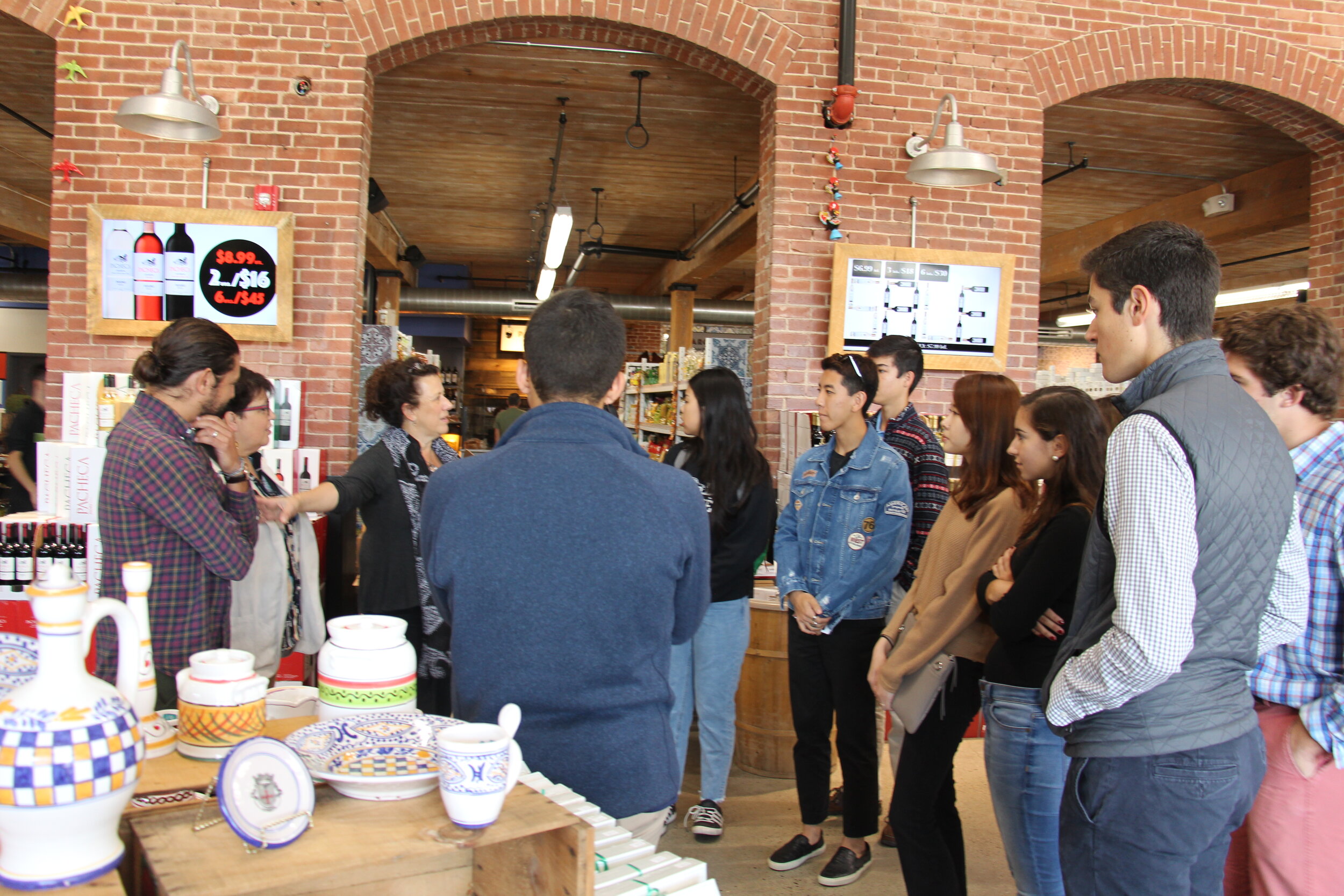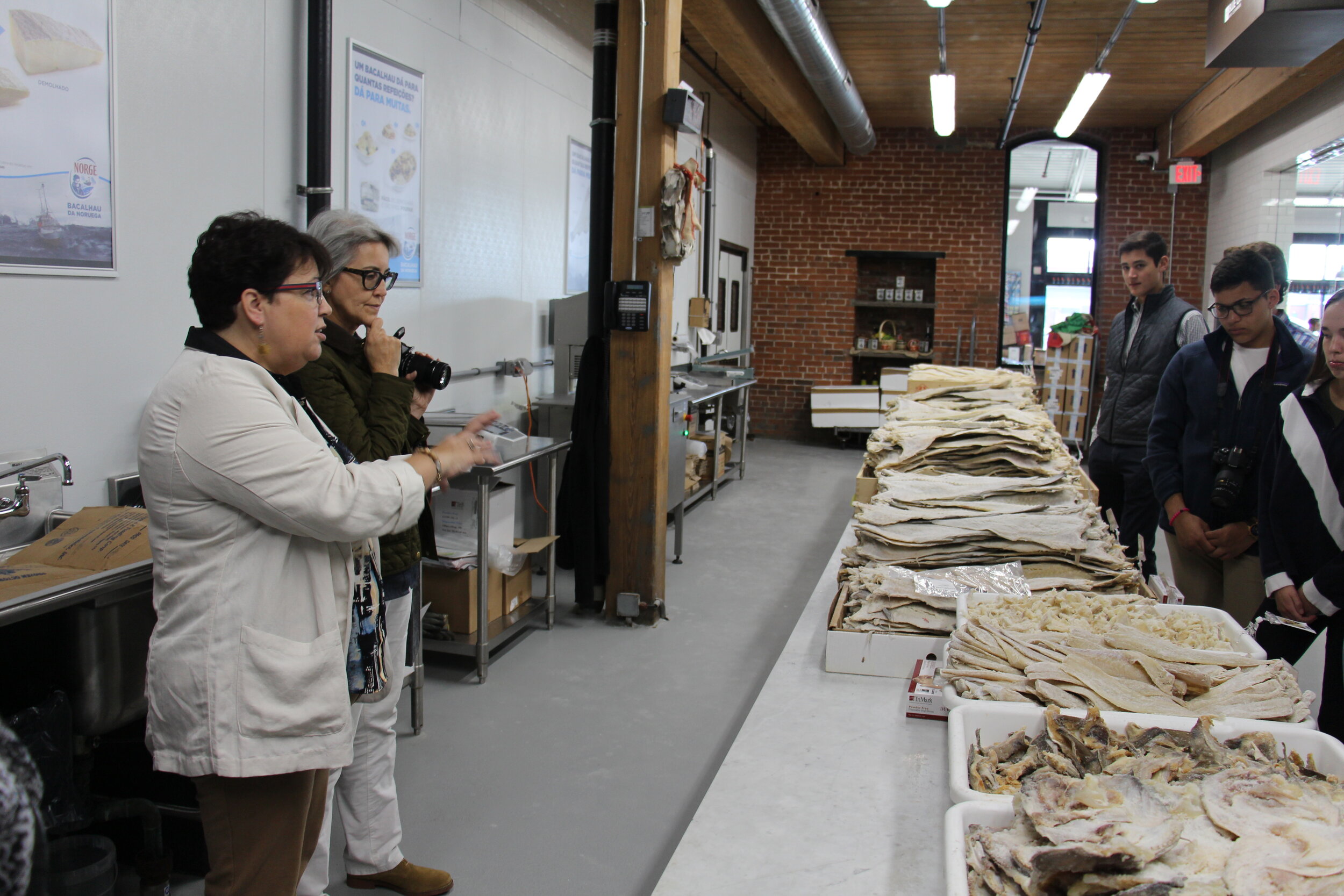Portugalia Marketplace
About twenty minutes from the Abbey, you will find one of Fall River’s best kept secrets: a virtual Whole Foods of Portuguese food and products. They are a spinoff of Portugalia Imports, becoming a showcase for their a praça (fresh fruit, produce, snacks, and dry legumes), o armazén (discounted products by the case), mercearia (Portuguese specialty groceries like olive oils, coffees, teas, chocolates, crackers, canned fish, etc.), cozinha regional (rustic homestyle cooking to go), charcutaria (dried and cured meats), queijaria (imported and domestic cheeses), and congelados (imported seafood). You can’t ignore their amazing temperature controlled room for their large variety of dried salt cod, or their cafe that serves a variety of coffee drinks, sandwiches and pastries. The Benevides family are wonderful hosts, giving students a grand tour and amazing lunch.
While everyone else was understandably fascinated by other amazing attractions at the Portugalia Marketplace, I was most intrigued by – las patatas fritas.
A junkie for chips, I am forever up for a spontaneous exploration of different flavors and brands. I scanned across the shelves, and these gracefully packaged beauties drew my attention: Torres, made in Spain, a brand I had never heard of.
Now remember, I come from China, a country famous for a wide array of affordable and delicious snacks. As a child I’d sit in the supermarket shopping cart, ask mother to push me into the chip section and wander off in a kaleidoscope of flavors. I even thought about producing chip-flavored perfumes. Imagine having a conversation, going like “hey whatcha’ wearing? Chanel? Dior? Smells fancy, you,” and then the response, “Nah, just crispy barbecue collection from Lays.” Then some jealous eyes thrown…
Fresh cucumber, curly kimchi, Spicy hot pot, sour fish soup, and Pepsi. Bear in mind, I am not describing a full meal, but different creative (and Asian) flavors I’ve tasted! Point is, I love ‘em, and thought I’d have seen ‘em all by age seventeen. Now in retrospect, how remarkably conceited I was!
As a chip junkie, I was in for a treat at Portugalia. The Mediterranean area is famous for its production of olive oil and seafood, as demonstrated in their creativity for chip flavors. I had the opportunity to try a few before impulse shopping.
Aceite de Oliva Virgen Extra and Hierbas Mediterráneas were both great choices. Similar in taste, both were rich in crispiness and exuded oil. A fresh, clean smell of oil, just the perfect amount. Because of the simplicity in flavor, both had to be extra exquisite in taste in order to satisfy and please the palate. They were the little black dresses of chips. The “hierbas” were visible as well, appearing as decorative green particles, reminding me of cilantro, bringing out the flavor in a dish and added color contrast.
Now the show is taken up a notch. Listen to the names: Trufa Negra and Caviar, screaming extravagance. A pack of both eventually found their way into my shopping cart. The chips contained real pieces of black truffle, unlike heartless products from most vendors. The Black Truffle flavor tasted just like real black truffle, which is a compliment to the extreme in itself. As for Caviar, a chemical reaction occurred right when it touched my tongue: saltiness, oiliness, savory, everything I ever hoped for the moment I saw its name. My friend had to take the bag away from me before a scheduled overdose. Wise move.
Chips: still a long way to go before becoming the guru. But I’m getting there. –Amber Liao ’17
When I first looked at the exterior and the interior design of the market, there was nothing different from the usual supermarket that I will always go to with my parents. But as we walked in and learned about Portuguese culture and food, there were various things that I never knew. Before trying some Portuguese dishes, we learned about traditional blankets and teacups from Portugal. Beginning with various teas, grape juice, cheese, fish, oil and wine, we experienced very new tastes. I have never tried such a variety of cheeses and oils. It was a totally new world for me to try different cheeses and oils. After a long tour of the market, we were able to try various dishes cooked from the Portuguese market. Egg tart and octopus were especially delicious with spicy sauce on the octopus. It was a great experience to learn about totally different culture and it helped to have better perspective on food within the diversity. Jennifer Park ’17
I don’t often find myself in Fall River, and when I do, I’m not usually there to find hidden pockets of cultures I know nothing about. However, the first thing I noticed about Portugalia when I walked in the doors that surprised me most was the energy. The image of Portugal in my head was of old “vavós” swirling a pot of some kind of cod stew, and maybe some types of sweet bread. I couldn’t have been more wrong.
While that was culturally accurate, Portugalia was bustling and humming with people of all ages, Portuguese classics, interesting new products, and the sounds and smells of a traditional kitchen, all in a modern building. We had the opportunity to tour the whole market, including the “secret” church upstairs that is open only to employees and members of the public who are in the know. We were also lucky enough to have a traditional Portuguese meal with the owner of the market, and in typical Portuguese fashion, we were served massive portions and were heavily pressured to keep eating, far past the time when we felt full. This was easy to do, though, because everything was so interesting and new each time a new plate was passed around. The bacalau was probably my favorite: a mash of flaked cod, potatoes, eggs, and seasonings that was salty while being balanced out by the simple potato. We were also served octopus, which was perfectly tender and briny, yet had that innate sweetness of seafood. After countless more courses of equally delicious foods, we were plied one last time with dessert: malassada, a Portuguese fried dough that was shellacked with sugar and fried until crispy perfection. I think that had they brought anything else out, I would have refused taking one more bite. But in the presence of fried anything, that thought quickly dissipated. Portugalia was a glimpse into the modern Portugal that is alive practically in our backyards…or Fall River.–Sydell Bonin ’18
As I sluggishly stepped off the bus and walked toward the tucked-away glass and brick building, I only thought of lunchtime and when my feet would get a break. However, my thoughts quickly changed the moment I stepped foot into Portugalia Market. All around the store were colorful but delicate handmade Portuguese textiles and art prints, surrounded by tasty Portuguese cuisines and eager shoppers ready to indulge in these culinary perfections. I started to murmur ‘Uau’ outloud—a rough translation of ‘Wow!’ I picked up while in Salamanca, Spain this past summer—but was rather afraid to say anything out loud since my stomach was doing most of the talking.
After meeting the owner, our group ventured off on a tour of the marketplace itself. If only I could express through words how excited I was to see, and taste, the variety of dishes. One of my major takeaways from this trip was my experience with drinking Sangria…(non-alcoholic, of course). Since the majority of this drink was grapes, and since grapes are not my preferred fruit, I hesitantly drank the grape mixture from the small plastic cup given to me. Well, to say the least, my opinion on grapes forever changed from that moment. I downed the first cup and before I realized it, I was on to my third, then fourth. I was amazed by the freshness and sweet taste packed into such a tiny cup. I would’ve bought a whole barrel, but I thought that was a bit overkill, and I had no knowledge of what else this neat store was to offer.
Next, our group carefully went aisle to aisle, taking in the sweet, fresh, and lovely smells until arriving in the dried cod section. The overpowering smell arising from the fish cutting and preparation room immediately knocked me back. I looked around to see if any of my friends had shared a similar reaction, and reassuringly enough, all of us non-New Englanders had.–Michael Griffin ’18
I never knew about the charm of Portuguese food until this Culinary Arts adventure to the Portugalia Market. The entire market was delicately decorated and arranged, combining Portuguese food and culture. Together, the traditional draperies on the wall and the fresh food in the market generated an atmosphere of hospitality and home. Throughout the tour of the market, the refrigerated room with dry codfish was certainly a new experience for me. Though the sour and salty smell was intense and extreme, the chance for me to see dry fish tongue and touch an octopus certainly made it all worth it. Also, despite my indifference to a chapel because of my Catholic school life, the well-furnished chapel room on the second floor of the market offered me much surprise and wonder.
When the tour was over, a table covered with all kinds of food suddenly changed the already interesting market to a paradise on earth. Due to my obsession with desserts and sweets, the Portuguese egg tart became my absolute favorite. Aside from its taste, the egg tart reminded me of home because of its popularity in China due to Portugal’s past colonization in Macau. Following the old Portuguese tradition that everybody must finish everything and leave nothing on the dining table, we Culinary Arts members once again proved our appreciation for food and finished even the last potato chip on the table. —Kevin Jiang ’17



























































































